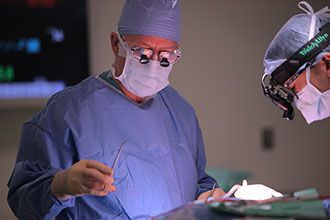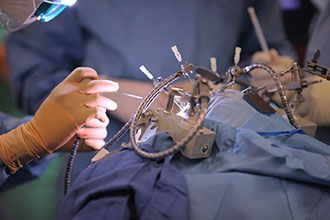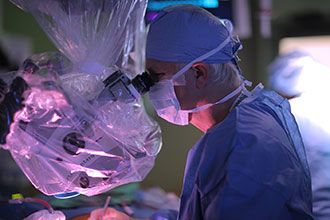
Neurosurgery (neurological surgery) is a highly specialized medical field focused on the surgical treatment of brain and spine disorders. Weill Cornell Medicine neurosurgeons are leaders in advanced, minimally invasive treatment methods, cutting-edge laboratorial and clinical neurosurgical research, and training for the next generation of leading neurosurgeons.
Our tripartite mission includes:
Education
Weill Cornell Medicine neurosurgery faculty members are committed to training tomorrow’s neurosurgeons — in the classroom at Weill Cornell Medical College and through our neurological surgery residency program, fellowships, and continuing medical education courses.
Research
We operate multiple research laboratories investigating new treatments for brain tumors, spinal disk degeneration, cerebrovascular conditions, and Parkinson’s disease and other movement disorders. We are also pioneers in clinical research, conducting a wide range of clinical trials for treatments of neurosurgical conditions.

Patient Care
The faculty members of Weill Cornell Medicine Neurological Surgery perform state-of-the-art procedures for a wide range of brain and spine conditions. We are fortunate to be a part of the NewYork-Presbyterian/Weill Cornell Medical Center, consistently ranked as one of the top hospitals in New York, with one of the top neurosurgery programs in the nation. (For more about our services for patients, please visit our clinical site at Weill Cornell Medicine Neurological Surgery.)
Although traditional neurosurgery relied heavily on open surgical procedures including craniotomies and craniectomies (in which a portion of the skull is removed to access the brain), today’s neurosurgeons are more likely to use miniature tools that require smaller incisions, produce less trauma and allow for faster recovery times. Modern neurosurgery includes:
Microsurgery
Neurosurgeons operate using a microscope to visualize the tiniest of brain and spine structures. Our cerebrovascular neurosurgeons perform micro-neurosurgery to correct vascular disorders including aneurysms, while our neurosurgeons who specialize in spinal surgery use microscopes to assist in the surgical repair of herniated discs and other spinal disorders.

Endoscopic Neurosurgery
Neurosurgeons who specialize in endoscopic surgery use small, flexible, lighted tubes called endoscopes to visualize various parts of the brain, skull base and spinal cord through small openings. The evolution of endoscopic neurosurgery has greatly advanced the treatment of pituitary tumors (which can now be treated through the nasal passages, without incision). Endoscopy is also invaluable for treating cerebrospinal fluid leaks, disorders of the cranial nerves as well as cysts and tumors that form in the brain and spine.
Interventional Neuroradiology (INR)
Interventional neuroradiology is a relatively new specialty that combines advanced three-dimensional imaging techniques with endoscopic surgical procedures. Our INR specialists – neurosurgeons with advanced training in radiology – perform minimally invasive endoscopic techniques using high-tech imaging equipment to guide their work.

Stereotactic Radiosurgery
Weill Cornell Medicine neurosurgeons use stereotactic radiosurgery to pinpoint tumors or other targets, precisely delivering highly focused radiation with little or no effect on normal surrounding tissue. Stereotactic radiosurgery has been used with great success for the treatment of brain tumors and other conditions, as an alternative to “open” surgery. Neurosurgeons who specialize in stereotactic radiosurgery may perform procedures on a LINear ACcelerator (LINAC), Gamma Knife, or CyberKnife.
Intraoperative Imaging
Advances in imaging techniques (including Computerized Tomography [CT], MRI and Positron Emission Tomography [PET] scans) allow our neurosurgeons to view highly detailed photographs while they are operating.
Lateral-Access Spinal Surgery
Weill Cornell Medicine neurosurgeons who specialize in spinal surgery (who are part of NewYork-Presbyterian Och Spine) now use advanced lateral-access procedures to approach the spine from the side, rather than through the large muscles of the back. Lateral-access surgery causes less pain, produces less trauma and allows for faster recovery times.

